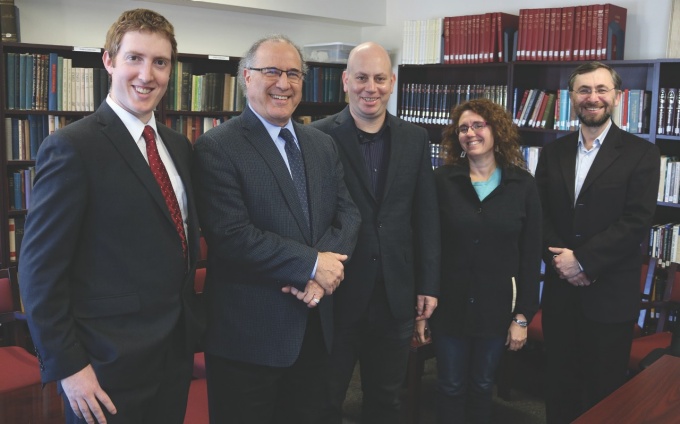Jewish Thought at UB

Left to right: Professors Alex Green, Richard Cohen, Noam Pines, Marla Segol and Sergey Dolgopolski
The Department of Jewish Thought at the University at Buffalo is a pioneering interdisciplinary program centered on making intellectual resources of Judaism, from antiquity to the present, available for broader humanities and the sciences in view of the current challenges of modern society. Students in the department benefit from individual attention of the professors in an environment stimulating to personal, intellectual and professional growth.
Our Degree Programs
The department grants a Masters of Arts, Bachelor of Arts and Minor degree in Jewish Studies, and offers a variety of courses in Jewish religious, philosophical and cultural traditions, as well as Modern Hebrew. UB’s Department of Jewish Thought is the first of its kind within the SUNY system and plans to establish master's and doctoral degree programs.
No matter what your career goals are, I recommend that every student take at least a few classes through the Department of Jewish Thought. The intimate classes, coupled with intense subject matter and professors who really care about you, make this department invaluable.”
-Benjamin Balderman
Our History
On December 15, 2015, Bruce Pitman (former Dean of the College of Arts and Sciences), announced the official formation of the Department of Jewish Thought. Expanding the Institute of Jewish Thought and Heritage (IJTH), the Department of Jewish Thought is a multidisciplinary research and degree-granting program focused on the contributions of Jewish tradition to Western civilization.
The Gordon and Gretchen Gross Professorship in Jewish Studies
The Gordon and Gretchen Gross Professorship in Jewish Studies was established in November 2007 to support the University at Buffalo's efforts to create a world-class, degree granting Jewish Studies program. This lead gift to the University at Buffalo to fund the Gordon and Gretchen Gross Professorship in Jewish Studies helped fund the new Department of Jewish Thought as a pioneering program on the national and international scale designed specifically to advance scholarship and teaching that makes intellectual riches and resources of the Jewish tradition of learning and scholarship available to broader humanities and across the divide between humanities and sciences; and mobilizes these intellectual resources to address every new challenge that is greeting humanity.
Now, when humanities are in crisis and technologically oriented thinking threatens to transform a well-known fallacy of using natural science data to answering ethical and moral questions into a commonly accepted and recognized way of thinking and acting, this philanthropic action revealed its new significance: to access and resist the threats technocratic thinking is positing to us.
In order to fulfill that crucial mission, the department has already attracted both leading and very promising young scholars of Jewish Thought in its different fields—from Talmudic literature, to medieval and modern philosophy, mysticism, and ethical theory, to secular modern Jewish Literatures in Hebrew, German, and Yiddish—and is looking forward to attracting new scholars to develop other fields of inquiry in Jewish Thought.
